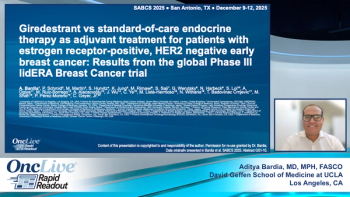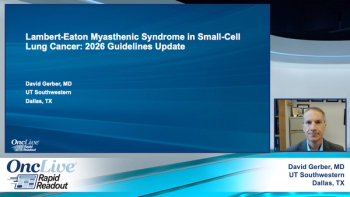
|Videos|June 30, 2021
Rapid Readouts: Treatment Preference Results From the Phase 2 ODENZA Trial
Neal Shore, MD, presents data on treatment preferences from the phase 2 ODENZA trial of darolutamide and enzalutamide in men with asymptomatic or mildly symptomatic metastatic castrate-resistant prostate cancer. The results were reported at the 2021 American Society of Clinical Oncology (ASCO) Annual Meeting.
Advertisement
Neal Shore, MD, discusses data from the following presentation:
- ODENZA, a prospective, randomized, open-label, multicenter, crossover phase 2 trial of treatment preference between darolutamide and enzalutamide in men with asymptomatic or mildly symptomatic metastatic castrate-resistant prostate cancer (CRPC) (
Shore, ASCO 2021, abstract 5046 )- The study’s objective is to investigate preference of darolutamide vs enzalutamide treatment in men with asymptomatic or mildly symptomatic metastatic CRPC (NCT03314324).
- Open-label, multicenter, crossover phase 2 trial:
- Period A + B:
- Comparator arm 1: darolutamide (1200 mg) 1x daily for 12 weeks
- Comparator arm 2: enzalutamide (160 mg) 1x daily for 12 weeks
- 2-week washout period between crossover from period A to B
- Primary end point: patient preference
- Secondary end points: reasons for patient preference; prostate-specific antigen (PSA) response
- Period A + B:
- Conclusions: Treatment preference
- 48.5% of patients preferred treatment with darolutamide; 40.0% preferred enzalutamide
- 11.5% of patients did not have a treatment preference for either darolutamide or enzalutamide.
- Reasons given by patients for preferring darolutamide treatment included lower rates of fatigue, falls, and cognition impairment, as well as the ease of treatment regimen.
- Fatigue was noted in 21% of patients treated with darolutamide vs 36% of those treated with enzalutamide.
- 48.5% of patients preferred treatment with darolutamide; 40.0% preferred enzalutamide
- Conclusions: PSA decline
- Similar rates in PSA decline were noted between darolutamide and enzalutamide.
- A PSA50 response was achieved in 76.2% and 83.9% at 12 weeks with darolutamide and enzalutamide, respectively (P = .13).
- Similar rates in PSA decline were noted between darolutamide and enzalutamide.
- While treatment preference between darolutamide and enzalutamide did not reach statistical significance, a greater number of patients expressed a preference for treatment with darolutamide.
- Results from the ODENZA trial provide additional evidence for how patients respond to and tolerate the different treatments available for use in asymptomatic or mildly symptomatic metastatic CRPC.
Advertisement
Latest CME
Advertisement
Advertisement
Trending on OncLive
1
Long-Term Cilta-Cel Data Show Low Rates of PFS Events in Standard-Risk R/R Myeloma
2
Nonresponse to Bridging Therapy and Peak ALC After Cilta-Cel Are Associated With Neurotoxicity, NRM in Myeloma
3
FDA Updates Axi-Cel Label to Remove Limitation of Use in R/R PCNSL
4
Real-World Data Support Clinical Benefit With Lifileucel in Previously Treated Advanced Melanoma
5




































